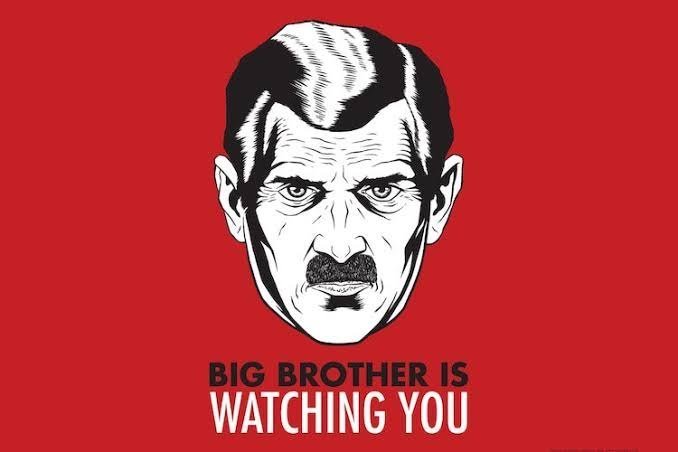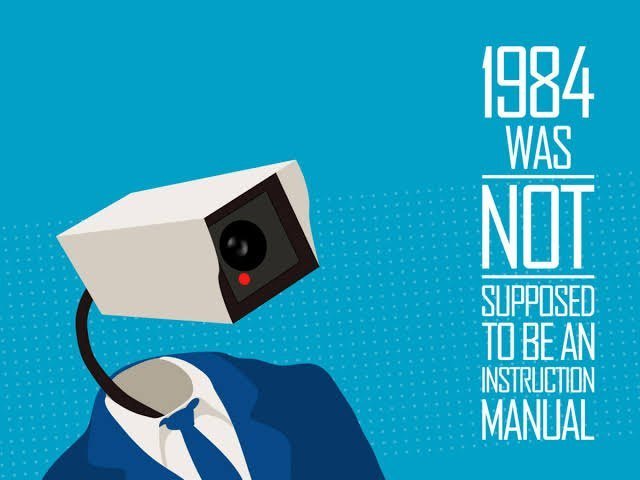Fantasising about the perfect utopian world is common now. We know what we want and we know what the world strives for. The idea of an alternate future has slowly disappeared into thin air. George Orwell’s 1984 gives you the perfect idea of this alternate future, a dystopian world. Much like the appalling and ghastly totalitarian rule of Hitler, Orwell’s dystopian world is under the sordid rule of The Party, headed by ‘Big Brother’. Everything that falls in the field of view of Winston Smith, the protagonist, is accompanied by Big Brother’s morbid face on it. ‘BIG BROTHER IS WATCHING YOU’, read the posters. As is evident from the horrifying statement, people and all their activities are under strict surveillance at all times.
The bitter truth, my friends, is that, the real world is much like Orwell’s imperfect world. The only difference is that, what is done there blatantly, is done here covertly. Relatable, isn’t it? Reminded me of the billion cameras that have been put up in the campus, and come to think of it, Big Brother does resemble our registrar in a lot ways.
Freedom in all its sense has been taken away from the people of Oceania. Orwell has without flaw introduced interesting elements in the book which keep the reader hooked. Surveillance monitors called ‘telescreens’ have been put up everywhere to keep an eye on the inhabitants, even the people’s history and language are controlled by The Party.
The part forcing its will on people to adapt to a whole new language is extremely interesting. It is called ‘Newspeak’ and attempts to prevent political rebellion by eliminating all words related to it. The reader will certainly take interest in the excessive amount of political oppression that the author has talked about as it is something the world has been trapped in since time immemorial. Even though the author has spoken in the context of a post-war nation where everything has been destroyed and there is no life at all, political oppression, I’d say is very much present in today’s time. The time has changed, but the times have not and the system has not. Orwell beautifully puts forth the idea of the most dangerous crime being the ‘thoughtcrime’. The freedom to think, like all other freedoms, has been taken away from people and is considered a serious offence. This, my friends, I could relate to really well. Even though we don’t have serious penalties for expressing ourselves, but you know what lies ahead if you let a ‘wrong’ thought slip out.
Winston, with no outlet to thought, secretly confides in a diary, which he knows will be the death of him. The author has crafted the system with great intricacy, certainly worth appreciating. The Party’s governmental apparatus includes three organs, the Ministry of Peace, which wages war; the Ministry of Plenty, which plans economic shortages; and the dreaded Ministry of Love, the centre of the Party’s loathsome activities. With just three lines, Orwell has depicted the mentality of The Party- WAR IS PEACE, FREEDOM IS SLAVERY, IGNORANCE IS STRENGTH. In a situation like this, the idea of love seems very far-fetched but Winston manages to kindle a covert relationship with Julia, who confesses her love for him by way of a chit, as again, saying it out loud would have probably resulted in death. While Winston is negative and believes that they are doomed for committing the crime of love, Julia is more optimistic and hasn’t lost all hope. Whether in such horrid conditions, two rebellious souls can survive, is a question the answer to which you’ll have to find out. Following the frenzy, a very interesting character, O’Brian, comes into the picture, who Winston believes is a secret member of the ‘Brotherhood’—the mysterious, legendary group that works to overthrow the Party. As O’Brian arranges a rendezvous with the two brave souls, the perfect amount of drama, nail-biting and back-stabbing is what follows.
The author’s description of the whole situation makes you empathise with the characters. Whether Winston and Julia are able to combat the opposition of The Party and keep their love for each other alive even in the hardest of moments, is something you’ll have to find the answer to. This book, dear reader, is for the pragmatic souls out there, so if you’re a big fan of fairy tale endings and ‘happily ever after’, you might be a bit disappointed. I personally could not have been more content after reading it. It was a good break from all the conventional love stories and I recommend all of you to read it.
This write up was submitted by Aishwarya Sethi (1st year)
The Blue Pencil does not claim ownership or any rights over the featured artworks. All rights of the featured media rest with their owner respectively.



